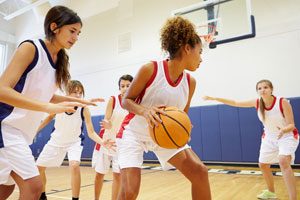
Nearly two-thirds of girls never shower after school PE lessons.
Half of boys and nearly two-thirds of girls say they never shower after school PE lessons, according to a study by the University.
With worryingly declining fitness levels among today’s British youngsters, the scientists feel more research now needs to be done to see if shunning the shower could be a barrier to children being more physically active and working up a sweat during PE.
The study, published in the European Journal of Sports Sciences, which assessed more than 3,000 secondary school children from eight schools, found that three quarters of pupils do not shower after PE lessons. Half of boys and two thirds of girls surveyed said they had never had a shower at school. Only 10% of boys and 7% of girls said they always showered.
Dr Gavin Sandercock, from the School of Biological Sciences at Essex, who led the research, said: “This study is part of a bigger study trying to understand factors which promote physical activity and fitness in children. We believe this is the first big study of pupils’ showering habits in English schools and were honestly surprised at how rare showering had become.”
Aside from the potentially antisocial consequences for classmates sitting next to someone who hasn’t washed after exercise, poor hygiene increases the risk of infection. Not having a shower after playing football, hockey or rugby could leave children with dirt and mud in cuts and grazes which is not washed out properly until they get home – sometimes six hours later.
The study also found children who did not shower were less active, took part in less after-school sports and girls who didn’t shower were even less physically fit than those who did.
“The issue of personal hygiene is one thing, but finding that children who don’t shower are less active and less fit is even more worrying,” added Dr Sandercock. “We know that children aren’t getting enough physical activity because we have seen their fitness declining. If the unwillingness to shower is a barrier to working up a sweat or playing sport it is something we need to tackle to promote activity at schools.”
The proportion of children who had ever had a shower at school was as low as 20% in some schools. Children from more deprived backgrounds were 40% less likely to shower than their more affluent classmates, but the study found children who did physical activity with adults in their families were twice as likely to shower after PE classes.
Dr Sandercock added: “Parents are such important role models for children’s physical activity habits and it seems that children from active families are more willing to shower after PE which means they can play hard, exercise hard and get dirty and sweaty in PE because they know they can shower after because they see doing this as the norm. If children are afraid to work hard and get sweaty in PE it might limit the benefit they can get from lessons. This is especially important in teenage girls because PE might be the only vigorous exercise that some girls regularly get. Unfortunately it was teenage girls who were the least likely to shower.”
The researchers did not ask why the pupils did not shower, but have suggested that finding out if showering is acting as a barrier to vigorous activity could really help to guide schools who are interested in investing in sports facilities, changing rooms and showers.
“The fact that at least some children in every school we surveyed said they always showered showed us that there is time for pupils to use the facilities.
“Despite this, we suspect that the real number of children who shower after PE is even lower than our figures suggest as we weren’t allowed to ask pupils about showering in a number of schools where the teachers said they knew nobody showered.”
Ends
Note to editors
For more information please contact the University of Essex Communications Office on 01206 872400 or email comms@essex.ac.uk.